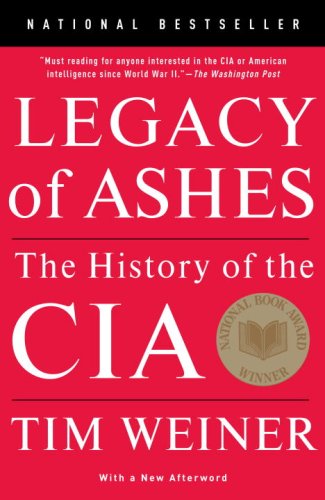This succinct history of the CIA is fascinating, if also a little bit forced in its message. A friend of mine often talks about how he much prefers scholarly nonfiction to commercial nonfiction reading because the former is thesis driven. Soon after I read the introduction to this book, I cornered him to tell him all about this piece of commercial nonfiction with a very clear thesis. Basically, the book is about how the CIA messes--and always has messed--up, how, closer to how the author puts it, the United States has failed to build an effective clandestine service. The thesis gives the book focus but also, I think, occasionally makes it a bit myopic.
What I mean by myopic is that the author puts the CIA's problems are front and center here and interprets all of the CIA's history through that lens. Certainly, the CIA has had its problems, but even its "successes" here are reinterpreted as failures or simply skimmed over. Certainly, some of the "successes," such as removing the democratically elected ruler of Iran (who the U.S. government thought too closely tied to communists) to reinstall the shah, have come back to bite the United States in some very inconvenient ways. And certainly the CIA has missed some very key events. But where it has managed to do things "right," such as helping to dismantle weapons programs in Pakistan and Libya or feeding disinformation for years to the Soviet Union, the author brushes past with simply a mention. The author points to other nations being much better at covert action, but his claims are never substantiated (indeed, such substantiation would be beyond the scope of this book, lest it grow to twice its size). But just how easy is it to spy, to tell the future, to subvert another nation's government? I don't think these are things any nation seems particularly good at, let alone the CIA.
Because of this singular focus on the CIA's failings, I'm left with a lot of questions--for example, about the CIA's role in the run-up to the latest war in Iraq. The author notes how the CIA fed very misleading information to the Bush administration about Iraq's weapons capabilities. If the reports were as alarming as the author makes them sound, no wonder President Bush took the nation to war. But mention of how the administration itself insisted on including certain information in media press releases and the like that the CIA had in fact debunked (or debunked soon after such things were made public) isn't included. The author mostly takes the Bush administration line and blames the fiasco of the war almost completely on CIA misinformation, ignoring that much of that blame was assigned after George Tenet was removed. My impression at the time--subsequently reinforced by Ron Suskind's The One Percent Doctrine--was that Tenet and the agency were made to take the fall for things it had never done. The fact that none of the information in Suskind's book, some of which Weiner would have had access to, even made it into this book makes me question how much I have been mislead--either by Suskind or by Weiner or by both. With hatchets to bury, as each of these authors had, it's hard to get a straight story.
But these things aside, Weiner has written a really compelling book, one that makes me cringe. I cringe because of the things the U.S. government has done in the name of national security, democracy, freedom, or whatever. I cringe because here is an agency built on lies, built on deceit, built on doing things in the shadows--illegal things, including (how typically hypocritical of our nation) terrorism. How does a president visit a foreign leader and then order an agency to assassinate him? How can a country that supposedly values freedom do all in its power to remove governments elected by their own people that it doesn't like and replace them with repressive regimes? How can humans be so cold to one another? Perhaps, the answer is in a statement by as one person interviewed in the book: once one pushes a button to detonate a bomb in a war, how different is it to assassinate someone in a covert war? After all, it's all just killing. And I suppose that's why this whole world is in the kind of state that it is in. God help us all before we destroy everything that lives on this planet.
Subscribe to:
Post Comments (Atom)







No comments:
Post a Comment